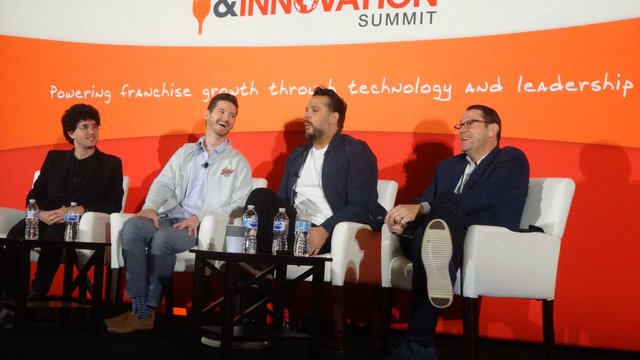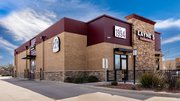Article
Leveling the limited-service playing field: 3 brands talk about 'democratized' dining
Limited-service restaurant startup and operation is easier than ever thanks to forces that level the playing field, like third-party delivery and commissary kitchens. At the recent Restaurant Franchising & Innovation Summit in Louisville, three restaurant leaders talked about the positives and negatives of these new market forces.

April 1, 2019 by Elliot Maras — Editor, Kiosk Marketplace & Vending Times
The playing field for limited service brands today has gotten a lot more level than in the days before market forces like third-party delivery, commissary kitchens and all forms of operationally enhancing technology became tools of the trade. Taken together, such forces are "democratizing" dining today with easier paths to entry, lower operational costs and overall more ease of daily business.
Those forces and how they change the limited-service game were the topic of an hour-long panel discussion at the Restaurant Franchising & Innovation Summit in Louisville, recently, where leaders from QSRs like Mutt's Canine Cantina, Grilled Cheese Heaven and Dillas Quesadillas discussed how they view the restaurant game on a flatter field of play.
In Los Angeles, for instance, at the delivery-specific brand, Grilled Cheese Heaven, leadership is pursuing third-party delivery aggressively. The company's transition from the more traditional Canter's Deli brand to one that is quickly adopting new technology was described by owner, Alex Canter, who said third-party delivery allowed him to
 |
Alex Canter of Canter's Deli, Kyle Gordon of Dillas Quesadillas, Kyle Noonan of Mutt's Canine Cantina and Mike Mirkil of Kitchen United discuss third-party delivery |
establish Grilled Cheese Heaven, which is supported by a pair of off-site kitchen commissaries. Canter has also created his own software solution, Ordermark, which integrates different third-party ordering services (Uber Eats, DoorDash, Postmates, etc.) in one platform which he has made available to other restaurants.
Commissary kitchens have allowed Canter's company to deliver online orders with minimal overhead, Canter said. In fact, he said no association is even made between the more traditional Canter's Deli and Grilled Cheese Heaven, which is a delivery-only brand consisting of food that hold up well in transit.
"You don't need brand recognition today to launch restaurants," Canter said.
Third-party delivery expected to grow
Canter believes food delivery services will continue to grow, and he sees it as a good thing since it brings an additional customer base, allows a restaurant to be more efficient and operate from a smaller footprint.
"We're now a consideration for people who are using those apps," he said.
In addition, delivery tickets on average are 60 percent higher than in-store tickets.
One of Canter's two commissary kitchens was profitable from the first month, he said, a feat he said is unheard of in the restaurant business, and that has allowed the company to generate an additional $200,000 a year.
Panelist Kyle Gordon, owner of Shreveport, Louisiana-based Dillas Quesadillas, agreed that online ordering has changed the business for the better in some ways, and it accounts for 80 percent of his business. He said a restaurant no longer has to be located on a main thoroughfare to be noticed.
Dillas Quesadillas, for its part, has expanded its business using pop-up food tents selling one food item with chips at special events, which generates an additional $40,000 to $50,000 in annual revenue, according to Gordon.
Challenges remain
The panelists, including Canter, agreed that third-party delivery still has some challenges. Canter said a number of the company's menu items did not maintain the correct temperature in transit.nHe also acknowledged there were problems with driver performance when the company first began offering third-party delivery.
Dallas/Fort Worth-based Mutt's Canine Cantina, an off-leash dog park and restaurant, stopped using third-party delivery for this reason, founder and owner Kyle Noonan said. Cost —which the panelists said typically range from 20 to 30 percent of the order cost for most third-party delivery services — was one of the issues cited. Gordon said the only way to be profitable using third-party delivery is to have low rent.
Customers have never complained about the food quality of third-party orders, said Gordon, who puts a text number on the bag to encourage customer feedback, but they have complained about order accuracy. Canter agreed cost is an issue with third-party delivery, but he nonetheless believes it is preferable to in-house delivery, due to the difficulty of maintaining good quality delivery drivers.
More choices to consider
Looking to the future, Gordon said he is interested in exploring the commissary option, and he is also looking for associates who will be passionate about the brand. Noonan said restaurants today have a choice of focusing on experience or convenience.
"If you're not in one of those two, you're going to lose," he said.
Mutt's Canine Cantina, which charges a monthly $16.95 membership fee, has opted for the latter. His goal is to have 250,000 members.
Feature photo: iStock
Inset photo: Networld Media Group
About Elliot Maras
Elliot Maras is the editor of Kiosk Marketplace and Vending Times. He brings three decades covering unattended retail and commercial foodservice.









